Landing
August 21st, 2024. It had been seven years since I last landed at Boston Logan Airport. Leaving the US for my military duty in South Korea, I never thought this return would take this much time, especially that I would get back to Boston with so many different things, including a pretty decent work experience, huge responsibility, and my wife.
Reliving college days is mystical to the extent that I even told my wife that I feel like I'm on a time machine. A lot of things were unchanged. My school, Boston College, was as beautiful as it was, and, believe or not, people were the same. Those kids who talk ridiculously loud in the library inherited their throne to the honorable heir, and cheerful events in the first week of school, such as, Involvement Fair, Freshmen Welcoming, and stuffs, were still there as well. Besides some exceptions, it was almost the same as it was (almost) 10 years ago.
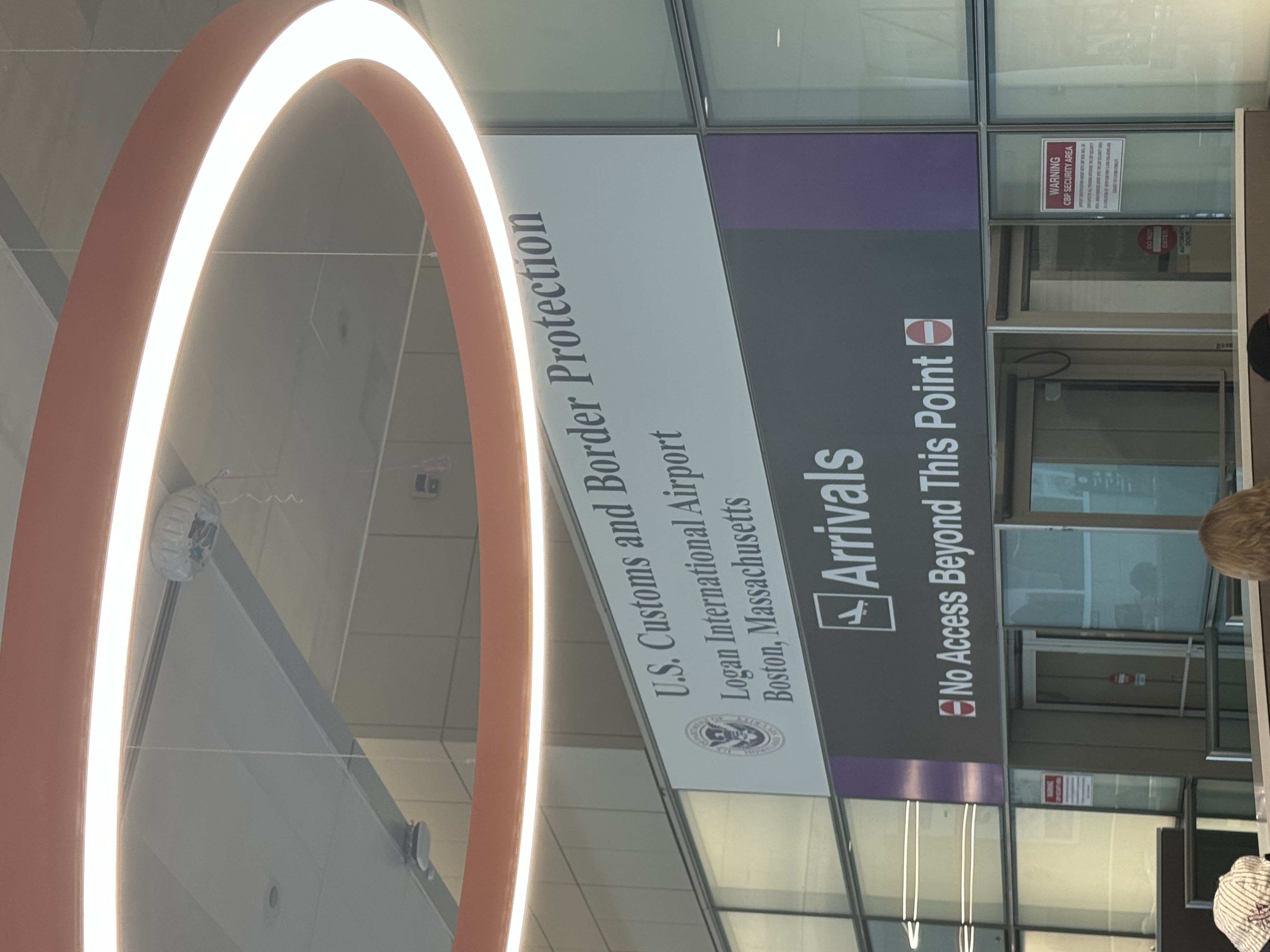
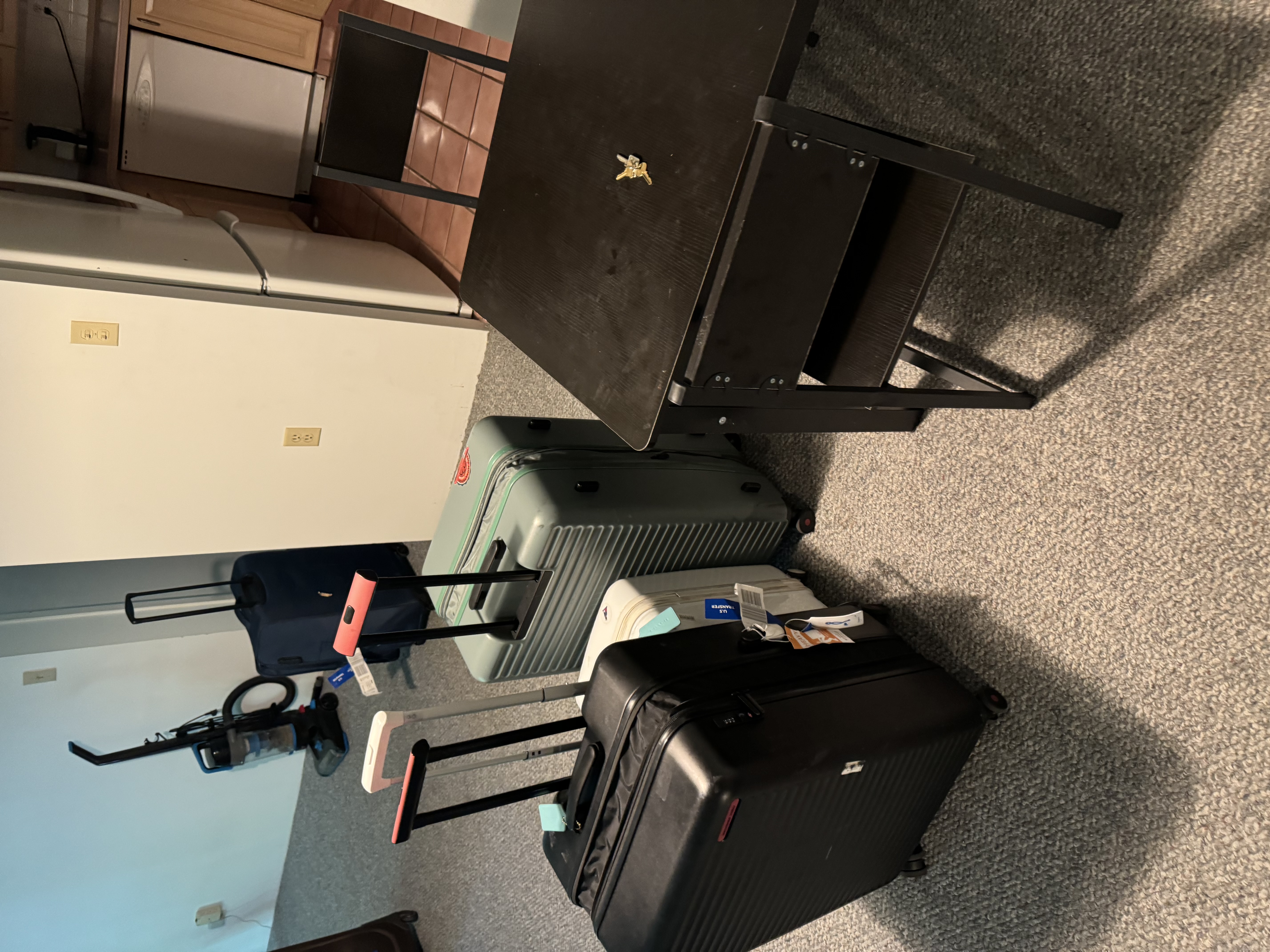
Arriving at Boston. August, 2024
Changes
One of a few changes I noticed was studying props in a learning environment. It took me several weeks to find out that every class is recorded and shared online, even those classes with old professors are. If a classroom doesn't have the recording device, they upload their talking textbooks to help students follow the material. That's amazing. You can miss classes and catch up so easily. On top of that, everyone is allowed to use an iPad for note taking. It was interesting that iPad is officially taken into a successor of hard-copy notebooks even by Jesuit liberal arts schools (positive). I believe this is another Pandemic influence.
Searching for changes on campus, I concluded that the most drastically changed was me. Back in the days I didn't know what I would do, so I jumped into many opportunities. Now, I see everything in a big lens, judging many things whether it is worth it or not. 'Is this worth my 70K tuition?' Unlike passionate college kids, I often run out of time and energy, so I must act strategically.
There is yet another change that got me a very mixed feeling -- attitude to learning. Many students are not participating in class anymore, or even not coming to class. Of course, you should count me in. I know there are several factors that contribute to my observation, but, as you might expect, AI tools in education are the prime suspect. They are double edged swords. They do help me understand better -- almost zero to hundred, but also discourage me from proactively engaging in the class to resolve my questions, making me think like "Oh, forget it. I can look it up myself". I'm 100% sure that I am not the only one here.
On Attitudes
I know it sounds bad. An old(er) dude talks bad about the younger. This has been happening in history since all the way back from ancient Greece, as allegedly Socrates stated.
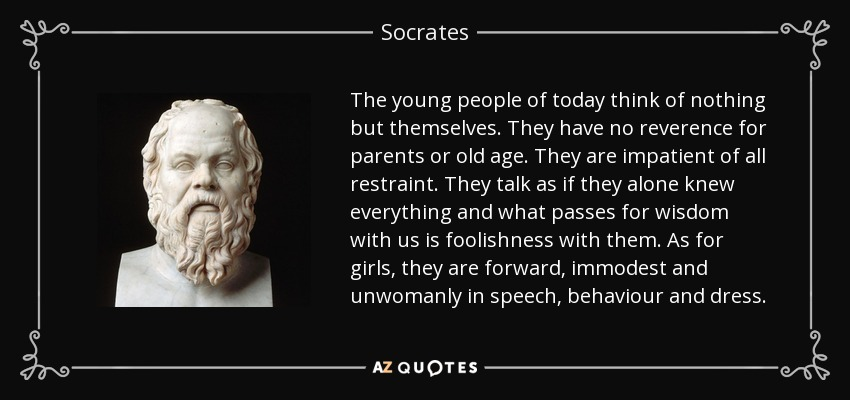
Figure 1 - Socrates on young people his days
On social media, people are crying and asking each other if it is still meaningful to study computer science or programming when AI can replace them so easy. I believe, at least in computer science perspective, the decrease in value of learning CS is nothing to be concerned about, but the loss of building a continuous learning and improvement mindset, what I call "attitude", is euthanizing CS.
Having this idea brought me back to 2017 when I barely got started studying programming. People said "soft skill cannot be taught", but now that I know that it is not generally true. In some situations, you can just follow a well-written manual to bond with other coworkers and make a meaningful contribution to the organization, or be evaluated as so. I was drawn to the idea of soft skills that I recall when I refer this:
Hard skills get you in, soft skills get you far.
— Sahil Lavingia (@shl) May 18, 2021
However, after years of working with those who do not have those communication skills, begrudgingly succumb to the fact that we should work with those people anyways, and having bunch of different situations that whether to have awesome soft skills is not the elephant in the room, I believe the most important aspect you should learn from your CS education is attitude to learning. It cannot be taught in your decent 50 page long onboarding doc, neither from pair programming with a 20+ YOE principal engineer in your org, nor from 10K meaningless words on your screen generated in 10 second with your crappy prompt starting with "Your job is to be my mentor to become a great software engineer...". The only place you can learn yearning for learning is a learning environment.
Illustrating my point:
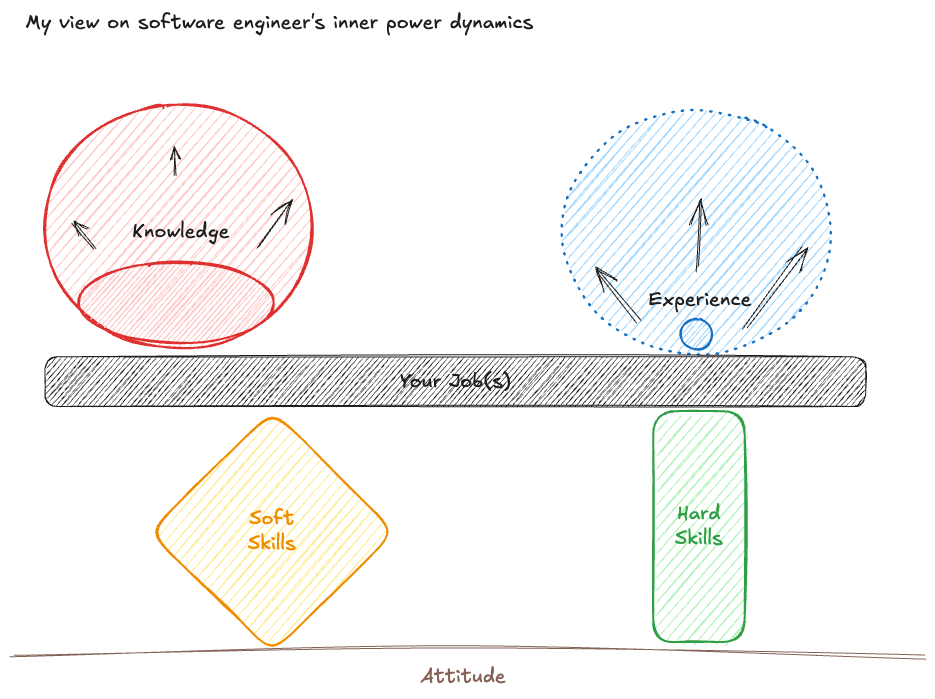
Figure 2.1 - Software Engineer's inner power dynamics
- Knowledge and experience naturally grow over time
- Your job(s) lays foundation of the growth and balances them (or your manager does)
- Soft skills and hard skills are gems that can be polished
- Attitude is a firm ground that holds up everything.
I met a lot of people who unwittingly ended up their software engineering jobs (or related) without those attitudes or habits, and a pebble can destroy their balance so easily.
On the other hand, plethora of learning sources and cherry-pick-free environment make the ground bumpy and slanted, causing us to fall into an infinite skepticism saying that "Do we even need this?".
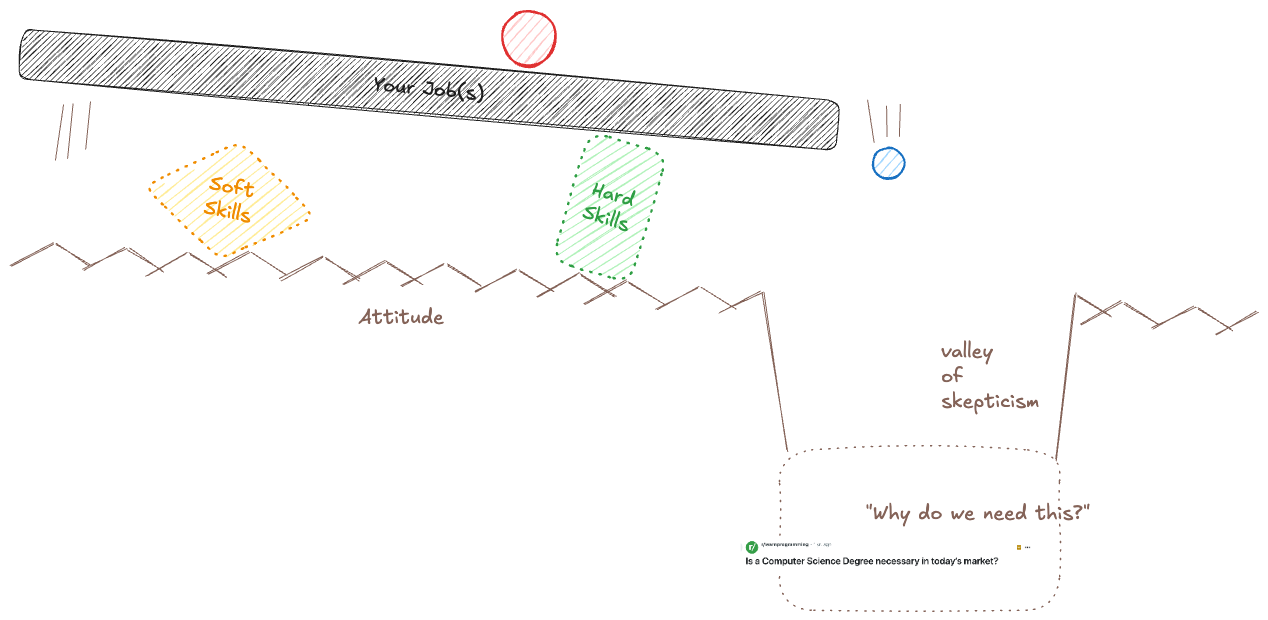
Figure 2.2 - Software Engineer's inner power dynamics (with bumpy attitude)
Suggested Changes
Here are my suggested changes in college CS education in response to AI tsunami:
Keep AI tools out of the classroom
Let's face the truth. The lead time to knowledge with AI is significantly shorter than the traditional learning method. The major distinction of education from your stackoverflow search is that it is not a game of how fast you earn the answer, which is, I believe, the beauty of education.
If we cannot ban it, we should control the usage. Limit electronic devices in the class and record it. At the end of each class, students take a full package home -- a recorded video, a summarized note, and analyzed excerpts from their textbook, papers, and relevant resources (image perplexity search results). Fully incorporating power of AI tools, we can refine and articulate our learnings better.
Preparing for class with AI makes more sense for both faculty/instructors and students. For instructors, they can be prepared and clearer about not only their expectations and rubrics but also assignments and assessment process, creating more meaningful learning experiences.
School-level LLMOps and Governance
Some schools started to standardize AI tools usage, e.g., Harvard's Generative AI guidelines and MIT's. Schools are even encouraging to use some gen ai tools:
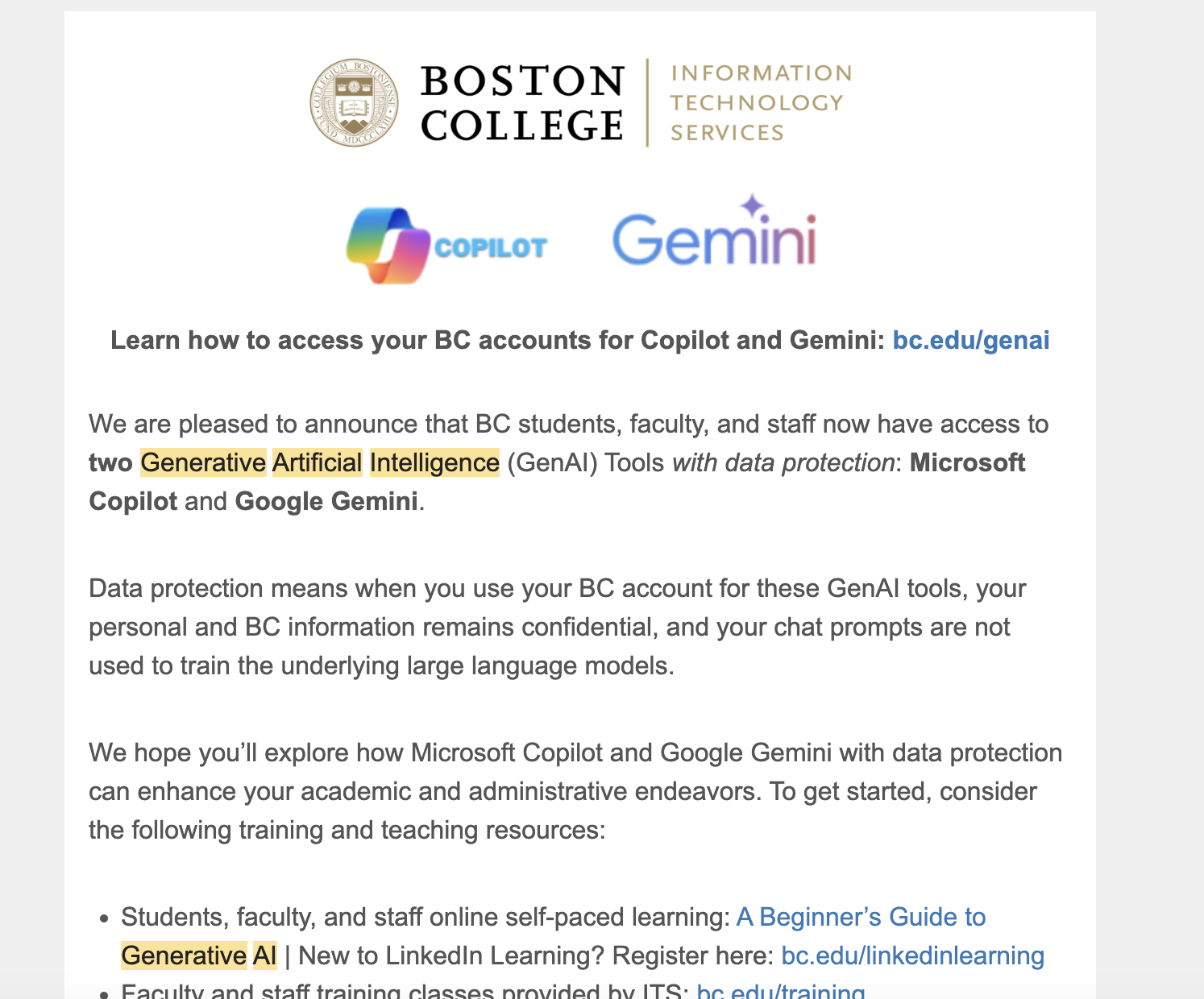
An email about BC's generative ai tool recommendation
Due to generative AI tools' probabilistic nature, data management is always one of main concerns. To address threats of leaking confidential data and unexpected abuse, the best approach is, for both enterprise and educational settings, to self-host the infrastructure. Within an isolated subnetwork and centralized storage to handle fairly manageable traffic, school-hosted generative AI is not a fantasy.
Offering historical course materials and past students' assignments as their knowledge base, schools can fully leverage their existing resources to provide students with values more tailored to them than those of out there (i.e., Web, public online courses, etc.).
Changes to existing great learning resources
Due to recent changes in the educational landscape and tech advancements, many great learning resources that were once highly effective are, unfortunately, becoming obsolete. As a result, it is essential that we make some modifications to ensure these resources remain relevant and beneficial for today's learners.
For instance, office hours, which used to be a vital opportunity for students to engage directly with their professors or TAs and seek guidance on various topics, have lost some of their effectiveness in the current environment (i.e., they are simply not going to OH). Office hours could be transformed into more personalized format like 1 on 1 meetings. Many questions will be answers by their syllabi and assignment answer materials, so instructors and students can focus on a broader perspective, like career paths and research topics.
The virtue of learning resources in college is that you need to be in the moment and proactively engage in the activities, which is highly conducive to your success in career as a software engineer.
Closing
CS education is losing it, or maybe so is Academia. The six or seven nines availability of the (pseudo)answers can easily mislead college students into believing that they are gaining all the information they need. This abundance of readily available answers can create a false sense of security, leading students to think that they do not need to engage deeply with learning experience or develop an attitude -- continuous learning and improvement mindsets.
How can we ensure quality of education without qualifying the availability? This is another engineering problem I need to solve for the rest of my semesters.
Special thanks to Minho Ryang, Seongyun (Kyle) Byeon, Hoyeon Lee for reading drafts of this.